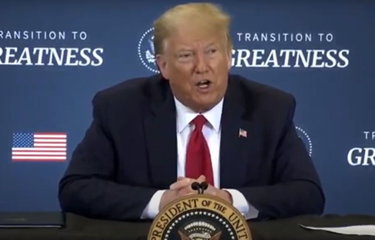U.S. President Donald Trump has issued a proclamation reopening the Northeast Canyons and Seamounts Marine National Monument, located off the coast of New England, to commercial fishing.
The 4,913-square-mile protected area was created under the Antiquities Act in 2016 by then-President Barack Obama, resulting in a ban on commercial fishing, mining, and drilling there, though he made a seven-year exception for the lobster and red crab industries.
Commercial fishermen sued to reverse those restrictions but had their lawsuit dismissed in January 2020.
Trump made the declaration at a roundtable discussion on commercial fishing in Bangor, Maine, on Friday, 5 June.
Trump’s revisions to Obama’s order creating the Seamounts monument leave the contours of the monument unchanged, and maintains a ban on oil drilling and exploration, but restores full rights to commercial fishing companies to fish in the area, according to fisheries trade group Saving Seafood.
“Today’s revision restores management of fisheries within the monument area to the regional management councils created under the Magnuson-Stevens Act, once again allowing for the robust debate such impactful policy decisions demand,” the group said in a press release.
The group said it will push for a similar rollback on prohibitions on commercial fishing in other marine monuments, including the Papahānaumokuākea Marine National Monument and the Pacific Remote Islands Marine National Monument.
“Coalition members also continue to believe that there is no difference in principle between the Northeast Canyons and Seamounts Monument and other U.S. marine national monuments in the Pacific, and that the council process is the appropriate method for managing fisheries in all U.S. federal waters,” it said. “The U.S. has the largest exclusive economic zone (EEZ) in the world, and the U.S. Pacific is the largest part of the U.S. EEZ, with our Pacific fishermen working hard to provide economic vitality to their communities, and food security to our nation.”
At the meeting in Bangor, Trump said Obama’s order establishing the Seamounts monument and banning fishing “was deeply unfair to Maine lobstermen,” according to the Associated Press.
“We want conservation and good environmental practices – that’s very important – but we also want something that’s fair to you,” Trump said.
Environmental conservation groups, including the Center for Biological Diversity and the Natural Resources Defense Council, criticized Trump’s decision.
“These fragile, extraordinary ocean areas are full of thousand-year-old corals, endangered whales, and other precious marine life. They belong to all Americans, and they are held in trust for future generations,” NRDC Senior Director of Oceans Brad Sewell said in a statement. “A significant change to the monument or its protections –such as allowing commercial fishing – must be done by Congress, not by the President. The Antiquities Act gives the President power to protect special areas for future generations, not the opposite power to abolish those protections. Fishing poses a range of threats, such as harm to deep-sea corals from heavy fishing gear, and entanglement of bycatch and marine mammals.”
Sewell said the NRDC is prepared to sue the Trump administration “to protect these marine treasures from harm and exploitation by commercial fishing and other extractive industries.”
Oceana Senior Campaign Manager Gib Brogan also criticized Trump's reversal of the Obama-era protections. Brogan said.
“By allowing all fishing back in the Northeast Canyons and Seamounts and removing the phase-out of the lobster and red crab fisheries, the hundreds of marine mammals that swim in the monument will be at increased risk of entanglement, including the endangered North Atlantic right whale. And deep-sea coral and sponge gardens that are thousands of years old will lose protection from damaging fishing gear," Brogan said. "Protecting deep-sea waters is a win-win for both fishermen and healthy oceans, as healthy oceans from the seafloor to the surface will help sustain robust fisheries for years to come. The creation or expansion of the national marine monument does not restrict the amount of fish available to commercial fishermen, only the area in which boats can catch fish has been modified. Nothing indicates that fishing harvest has been harmed in the creation of any of the marine national monuments."
Brogan also threatened potential legal action against Trump's order.
"Oceana will make sure that President Trump’s proclamation will not go unchecked," Brogan said.
After Trump's announcement, the National Fisheries Institute applauded the Trump administration for "withdrawing arbitrary fisheries restrictions."
"We welcome efforts to refocus on fisheries regulation that are transparent, participatory, and science-based, and in this case best achieved through the New England Fishery Management Council," it said. "The Magnuson Stevens Act has long provided options for management councils to designate fishing areas and marine habitat for protection. This method includes an opportunity for multi-stakeholder input and a robust review of the applicable science. Advanced research assessments ensure proper levels of fishing are permitted in designated areas. Simply cordoning off zones on a map to harvesting without regard for the existing, well-constructed system has been duplicative and disadvantaged the men and women who work these fisheries and ultimately consumers. Seafood sustainability means a commitment to quantifiable science and the communities that depend on American fisheries."
Photo courtesy of The White House







